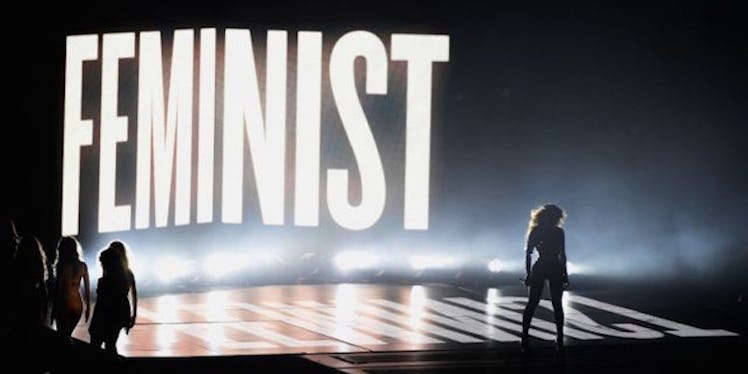
Is Feminism Only For White Women?
My affair with feminism is rather fresh, born out of my blossoming womanhood and newfound understanding of how universally sh*tty things are for women.
Long before Beyoncé made feminism hot, I advocated for women in my own "anything men can do, we can do better" kind of way, exhibiting feminism through my instinctually spiritual connection with close female friends.
As I've grown to understand society in a much more intricate way, feminist ideals and how they play out on a daily basis has become more complicated than fighting for an engineer Barbie.
Much like women of all races, black women face a myriad of adversities. And I truly believed that as a gender, we can all band together against the good ol’ boys club, scream in favor of girl power and fight the injustices of a patriarchal system.
However, my joy for being united in girl power was eclipsed by the markedly different biases feminism in regards to race.
"White feminism" is real.
For a while, I brushed off the term as nothing more than a buzzword, a new concept for the media to play up and capitalize on whenever it saw fit, still not realizing feminism is not a level playing field.
From my vantage point, what is widely known as mainstream feminism is a self-serving revolution in the interest of middle-class white women and white privilege.
For example, Amandla Stenberg was attacked for using Kylie Jenner as an example of racial insensitivity to black women's beauty. Or what about when Taylor Swift masterfully accused Nicki Minaj of pitting “women against each other” when the "Anaconda" singer was simply shedding light on black women's plight in the music business.
In the meantime, Patricia Arquette was cheered and praised for her well-intentioned Oscars speech.
Black women aren't protected in the same manner as white women. We often become caricatures the media loves to peg onto us whenever we uncover institutional attempts at erasure or racially insensitive missteps by non-black people. Under the use of "white feminism," black voices are squelched and headlines erupt with how vicious, angry and mad black women are for having an opinion.
In the aforementioned instances, justice weighs heavily in favor of white privilege.
Take also Elisabeth Hasselbeck, who instead of championing the #BlackLivesMatter movement for seeking answers for a woman’s (Sandra Bland's) mistreatment by police and subsequent untimely death, deems it a hate group that needs silencing. Huh?
How does one reconcile that, coupled with rampant racism and a mainstream agenda, feminism allows for white women to victimize themselves and disregard racial struggles while black women are supposed to stay silent?
Feminism for all?
Though black women have a different agenda than white feminists, it is not baseless. Black women assert themselves when speaking on hardships specific to our race. How we share our concerns should not be invalidated or seen as an attack to anyone.
Due to racism and other black-only oppressions that white privilege veils, we seek to be seen as equals not only by our male counterparts but also by non-blacks.
On the surface, we all want the same thing: Equal rights for women. Yet, divisive ideas perpetuated by ignorant people and mainstream media threaten that common goal.
As I’ve come to understand it, different brands of feminism exist because there are individualized obstacles every woman must face.
However, it's time for all feminists to focus on intersectionality. Recognition and respect of what other groups of women face is critical in order to reach our larger objective.
Otherwise, momentum slows and everyone loses.